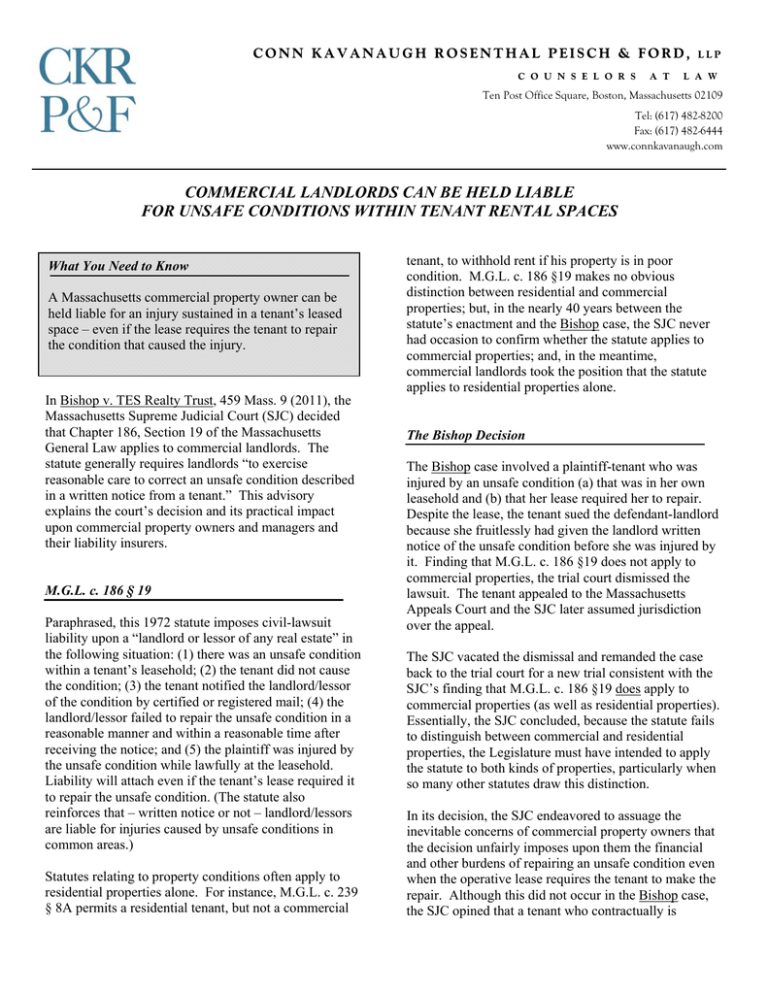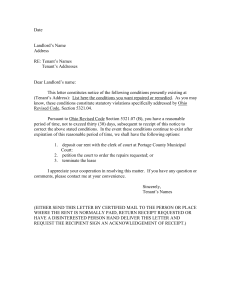
CONN KAVANAUGH ROSENTHAL PEISCH & FORD,
C O U N S E L O R S
A T
LLP
L A W
Ten Post Office Square, Boston, Massachusetts 02109
Tel: (617) 482-8200
Fax: (617) 482-6444
www.connkavanaugh.com
COMMERCIAL LANDLORDS CAN BE HELD LIABLE
FOR UNSAFE CONDITIONS WITHIN TENANT RENTAL SPACES
What You Need to Know
A Massachusetts commercial property owner can be
held liable for an injury sustained in a tenant’s leased
space – even if the lease requires the tenant to repair
the condition that caused the injury.
In Bishop v. TES Realty Trust, 459 Mass. 9 (2011), the
Massachusetts Supreme Judicial Court (SJC) decided
that Chapter 186, Section 19 of the Massachusetts
General Law applies to commercial landlords. The
statute generally requires landlords “to exercise
reasonable care to correct an unsafe condition described
in a written notice from a tenant.” This advisory
explains the court’s decision and its practical impact
upon commercial property owners and managers and
their liability insurers.
M.G.L. c. 186 § 19
Paraphrased, this 1972 statute imposes civil-lawsuit
liability upon a “landlord or lessor of any real estate” in
the following situation: (1) there was an unsafe condition
within a tenant’s leasehold; (2) the tenant did not cause
the condition; (3) the tenant notified the landlord/lessor
of the condition by certified or registered mail; (4) the
landlord/lessor failed to repair the unsafe condition in a
reasonable manner and within a reasonable time after
receiving the notice; and (5) the plaintiff was injured by
the unsafe condition while lawfully at the leasehold.
Liability will attach even if the tenant’s lease required it
to repair the unsafe condition. (The statute also
reinforces that – written notice or not – landlord/lessors
are liable for injuries caused by unsafe conditions in
common areas.)
Statutes relating to property conditions often apply to
residential properties alone. For instance, M.G.L. c. 239
§ 8A permits a residential tenant, but not a commercial
tenant, to withhold rent if his property is in poor
condition. M.G.L. c. 186 §19 makes no obvious
distinction between residential and commercial
properties; but, in the nearly 40 years between the
statute’s enactment and the Bishop case, the SJC never
had occasion to confirm whether the statute applies to
commercial properties; and, in the meantime,
commercial landlords took the position that the statute
applies to residential properties alone.
The Bishop Decision
The Bishop case involved a plaintiff-tenant who was
injured by an unsafe condition (a) that was in her own
leasehold and (b) that her lease required her to repair.
Despite the lease, the tenant sued the defendant-landlord
because she fruitlessly had given the landlord written
notice of the unsafe condition before she was injured by
it. Finding that M.G.L. c. 186 §19 does not apply to
commercial properties, the trial court dismissed the
lawsuit. The tenant appealed to the Massachusetts
Appeals Court and the SJC later assumed jurisdiction
over the appeal.
The SJC vacated the dismissal and remanded the case
back to the trial court for a new trial consistent with the
SJC’s finding that M.G.L. c. 186 §19 does apply to
commercial properties (as well as residential properties).
Essentially, the SJC concluded, because the statute fails
to distinguish between commercial and residential
properties, the Legislature must have intended to apply
the statute to both kinds of properties, particularly when
so many other statutes draw this distinction.
In its decision, the SJC endeavored to assuage the
inevitable concerns of commercial property owners that
the decision unfairly imposes upon them the financial
and other burdens of repairing an unsafe condition even
when the operative lease requires the tenant to make the
repair. Although this did not occur in the Bishop case,
the SJC opined that a tenant who contractually is
Client Advisory
March 2011
Page 2
required to repair an unsafe condition is “likely to repair
the condition herself”; and, even if the tenant requires
the landlord to repair the condition, the landlord can
repair the condition and then seek reimbursement from
the tenant. (It appears that the SJC did not intend to
mandate reimbursement in all such cases but, rather,
merely was pointing out that commercial leases typically
require it.)
What the Bishop Decision Means to Commercial
Property Owners/Managers and their Insurers
The Bishop decision means that an owner or manager of
commercial property who unreasonably fails to repair an
unsafe condition within a tenant leasehold (of which the
tenant provided notice by certified or registered mail)
will be held liable for any injury caused by the condition
and suffered by a person lawfully at the leasehold. The
rule applies despite any lease provision requiring the
tenant to repair the unsafe condition. The only exception
is for an unsafe condition caused by a tenant.
The decision leaves open certain issues that may be the
subject of future litigation. First, who decides whether
the tenant caused the unsafe condition? Future juries
likely will do so, and they presumably will err in favor
of injured plaintiffs rather than defendant-landlords who
refused to repair conditions they believed to be caused
by tenants. Therefore, the best course of action for a
landlord may be to correct any unsafe condition that
clearly was not caused by the tenant and then seek
reimbursement from the tenant. Meanwhile, landlords
should ensure that future leases require tenants to
(a) repair unsafe conditions within their leased spaces,
and (b) reimburse the landlord for any leasehold repairs
it may undertake.
Second, what is a “reasonable” repair and what is a
“reasonable” period of time? Here, again, future juries
likely will construe the statute in favor of injured
plaintiffs. Therefore, landlords would be wise to attend
to unsafe conditions as soon as practicable, using
qualified workers and quality materials. If a repair
somehow fails, then it probably will be deemed
unreasonable.
Third, will anything less than certified or registered mail
suffice to put a landlord on proper legal notice of its duty
to repair an unsafe condition? Probably not. The statute
is clear, and the court reiterated, that either form of
notice must be given. However, if any form of notice is
provided to a landlord, especially provable notice, such
as regular mail or e-mail, then the landlord again should
consider making the repair. It seems conceivable that a
future trial or appellate court will perceive this
procedural/notice requirement to be insubstantial and
impose landlord liability in a case where neither form of
statutorily-required notice was provided (so long as
some form of notice clearly was provided).
This client advisory was written by Michael T. Sullivan. If you wish to inquire further about our real estate or litigation practices,
please contact Michael or your attorney at Conn Kavanaugh Rosenthal Peisch & Ford, LLP.
The information contained in this Advisory may be considered advertising by Rule 3:07 of the Supreme Judicial Court of Massachusetts. This
Advisory contains material intended for informational purposes only, and should not be considered as legal advice by Conn Kavanaugh Rosenthal
Peisch & Ford, LLP. Your use of this Advisory does not create an attorney-client relationship. Please do not send or share with us any
confidential information about you or any specific legal problem without the express authorization of an attorney at Conn Kavanaugh Rosenthal
Peisch & Ford, LLP
© 2011 Conn Kavanaugh Rosenthal Peisch & Ford, LLP, Boston, MA. All rights reserved.

![[DATE] [LANDLORD’S NAME] [LANDLORS’S ADDRESS 1]](http://s2.studylib.net/store/data/015209382_1-43f6f34dffd5b41b97d8eef24e65816c-300x300.png)

